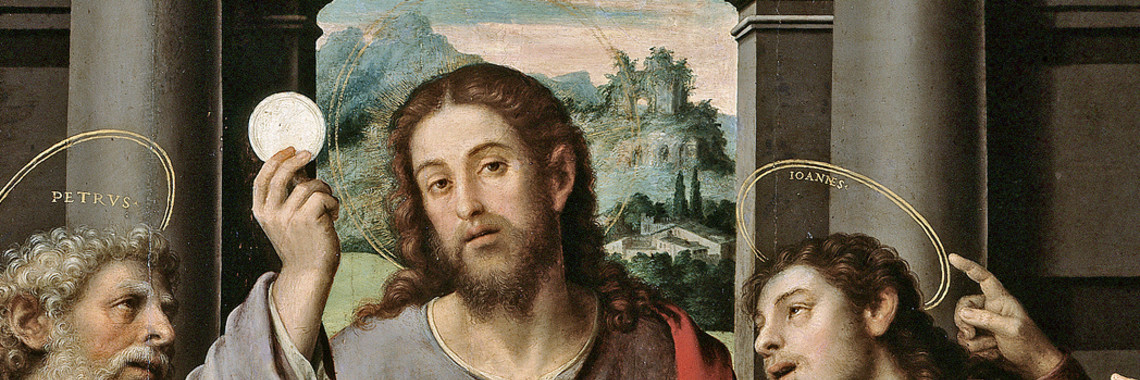The Holy Mass is at the center of our Catholic life because the Holy Eucharist is “the source and summit” of our Faith.
Jesus instituted the Holy Eucharist at the Last Supper while celebrating the Passover meal with his apostles. The gift of the Holy Eucharist makes Jesus present to us today and every day. He did not abandon us, rather he gave us the Church in whose authority priests and bishops consecrate the unleavened bread and wine at the Mass by which it becomes the body, blood, soul, and divinity of Jesus. Through this miracle the same Jesus who was crucified and rose from the dead may be received by Catholics today.
The grace of this sacrament provides supernatural food for the soul to strengthen and nourish the faithful as they seek greater union with Christ in their daily life. Each time Catholics receive holy communion they have an opportunity to grow in holiness through their openness to the graces offered in this encounter with Jesus. In the Catholic tradition we call these graces the fruits of Holy Communion.
Question 292 in the Compendium of the Catechism describes these fruits…
Holy Communion increases our union with Christ and with his Church. It preserves and renews the life of grace received at Baptism and Confirmation and makes us grow in love for our neighbor. It strengthens us in charity, wipes away venial sins and preserves us from mortal sin in the future.
Catholics believe that the presence of Jesus remains in the consecrated host and Precious Blood as long as they remain unconsumed and intact. For this reason, all of the Precious Blood is consumed during the Mass. Any remaining hosts are placed in the tabernacle, a beautiful box that reminds us of the tabernacle of the Old Testament where God visited his people. Today, Jesus waits for us in tabernacles throughout the world. He has given us a wonderful gift in his enduring presence in the Holy Eucharist and invites us to visit him often to find peace in his presence and give him our adoration and thanks. Throughout the history of the Church the Holy Eucharist has been taken to the sick or homebound who are not able to attend Mass. This is only possible because of the gift of Christ’s abiding presence.
Children ordinarily prepare to receive First Holy Communion around the ages of 7-8 (2nd grade). Part of the process includes preparation for First Penance (Confession).
Adults who have not yet been baptized or those who were baptized in another Christian tradition prepare for First Holy Communion through the RCIA process.
The Real Presence of Jesus Christ: Witnesses from the Early Church
So long as the prayers of supplication and entreaties have not been made, there is only bread and wine. But after the great and wonderful prayers have been completed, then the bread is become the Body, and the wine the Blood, of our Lord Jesus Christ. -St. Athanasius
Just as the bread and the wine of the Eucharist before the holy invocation of the adorable Trinity were simple bread and wine, but the invocation having been made, the bread becomes the Body of Christ and the wine the Blood of Christ. -St. Cyril of Jerusalem
They [the Gnostics] abstain from the Eucharist and from prayer, because they do not confess that the Eucharist is the flesh of Our Savior Jesus Christ, flesh which suffered for our sins and which the Father, in his goodness, raised up again. -St. Ignatius of Antioch
The bread, as the Apostle Paul says, ‘is consecrated by God’s word and by prayer’; not through its being eaten does it advance to become the Body of the Word, but it is made over immediately into the Body by means of the word, just as was stated by the Word, ‘This is My Body!’ …In the plan of His grace He spreads Himself to every believer by means of that Flesh, the substance of which is from wine and bread, blending Himself with the bodies of believers, so that by this union with the Immortal, man, too, may become a participant in incorruption. -St. Gregory of Nyssa









